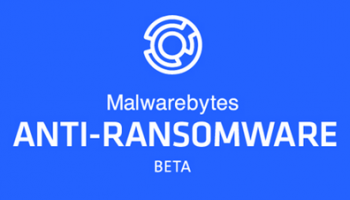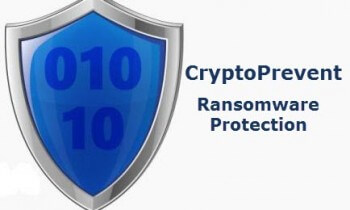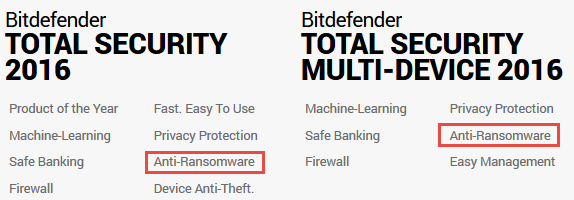Ransomware: a type of malware that restricts access to the infected computer system in some way, often by encrypting data, and demands that the user pay a ransom to the malware operators to remove the restriction ~ Wikipedia
 While malware and cybercrime are on the increase in general, the consensus among security experts is that Ransomware in particular is fast becoming one of the most dominant threats. No surprise then, that the well respected security firm Malwarebytes’ latest offering is a software dedicated to preventing ransomware infections.
While malware and cybercrime are on the increase in general, the consensus among security experts is that Ransomware in particular is fast becoming one of the most dominant threats. No surprise then, that the well respected security firm Malwarebytes’ latest offering is a software dedicated to preventing ransomware infections.
News of Malwarebytes latest release is all over the net. However, before you rush off and install Malwarebytes Anti-Ransomware Beta here is some important information you need to be aware of:
Malwarebytes Anti-Ransomware Beta Facts
- False Positives: Malwarebytes Anti-Ransomware is still in early Beta stage and, while the security company claims that during testing the software has prevented all types of known ransomware infections to date, there are many user reports of serious issues following the blocking of legitimate programs.
- Free or Not: The Beta version is available for free during the software’s initial testing period. However, once the software has matured to the point of general release it will become a Premium (commercial) product.
- Standalone or Integrated: According to a post on the Malwarebytes Forum, the final version of Malwarebytes Anti-Ransomware will not be available as a standalone product but will instead be “rolled into existing products“. One assumes that means it will eventually be integrated into Malwarebytes Anti-Malware.
Bottom Line: Unless you are an advanced user with the confidence and know-how to deal with potentially serious issues, it would be ill advised to install this software at this stage.
Anti-Ransomware Alternatives
In light of the increasing threat posed by Ransomware, a number of security companies have released free software dedicated to preventing this type of infection. However, the majority of the free offerings are limited to protecting against one or possibly two of the most prevalent types of ransomware and do not protect against all variants. For example; as the name suggests, Bitdefender’s CryptoWall Vaccine protects against the CryptoWall ransomware only.
CryptoPrevent
 That said, the one free product I would recommend is CryptoPrevent. I reviewed CryptoPrevent back in 2013, not long after its initial release. However, the software has matured considerably since then. This from the developer: “CryptoPrevent was originally designed to prevent infection from the CryptoLocker threat which emerged in late 2013. Since that time, CryptoPrevent has grown into a robust solution, providing protection against a wide range of ransomware and other malware“.
That said, the one free product I would recommend is CryptoPrevent. I reviewed CryptoPrevent back in 2013, not long after its initial release. However, the software has matured considerably since then. This from the developer: “CryptoPrevent was originally designed to prevent infection from the CryptoLocker threat which emerged in late 2013. Since that time, CryptoPrevent has grown into a robust solution, providing protection against a wide range of ransomware and other malware“.
Following a fairly exhaustive search, I came across only one product which the developer pretty much guarantees will protect against all types of ransomware. That’s not to say there aren’t more out there, but HitmanPro.Alert was the only one I could find.
The exclusive Risk Reduction features of HitmanPro.Alert includes behavior-based protection against high-impact crypto-ransomware, a prolific threat that slips by web filters and antivirus defenses every day. The signature-less operation of HitmanPro.Alert’s CryptoGuard technology universally prevents spontaneous encryption of data by cryptolockers.
Unfortunately, HitmanPro.Alert is not free and will set you back $24.95 per annum.
UPDATE:
One of our readers has kindly reminded me about “WinAntiRansom” via the comments. This premium anti-ransomware product comes from the same stable as WinPatrol and includes total protection at a very reasonable price (a review is on the way). Many thanks to Ed.
Antivirus & Anti-Ransomware
Reading about all this got me to thinking about antivirus solutions and whether or not they include protection against ransomware infections. I think it’s pretty safe to assume that free antivirus solutions do not. However, there doesn’t appear to be a definitive list of commercial antivirus products which include this type of protection. So I set about thoroughly searching through the sites of a number of leading antivirus vendors looking for any mention of ransomware protection, and this is what I came with with:
- Avast Internet Security & Premier – YES
- Bitdefender Total Security – YES
- Bullguard Internet Security & Premium – YES
- McAfee range of products – YES
- Trend Micro range of products – YES
- AVG Pro – NO
- Avira Internet Security & Antivirus Pro – NO
- Bullguard Antivirus – NO
- ESET NOD32 & Smart Security – NO
- F-Secure Antivirus & Internet Security – NO
- Kaspersky range of products – NO
- Norton range of products – NO
- Panda Antivirus Pro & Internet Security – NO
IMPORTANT NOTE: Just because ransomware protection is not specifically mentioned by a vendor doesn’t necessary mean it is not included. However, considering how critical this type of protection has become, I think it’s fair to assume that no mention more than likely means no protection.
Final Word
One of the most prominent security threats is something which is completely unpatchable, the human element! Most if not all ransomware requires some sort of user interaction to deliver its payload – e.g. clicking on a malicious link or popup ad, or opening a malicious attachment. As we’ve re-iterated many times here at DCT; common sense, vigilance, and caution constitute your best defenses.






I must agree that their is very little that can be done about the HUMAN link when it comes to viruses and malware, except try and clean the PC.
Avira does provide ransomware protection.
http://blog.avira.com/ransomware-interview/
Well Arthur, they really should include that information on their site. How are potential customers supposed to know otherwise?
Anyway, appreciate the additional information, thanks.
Not to take anything away from Malwarebytes, understanding that this is still in beta and I am sure it will be very good, however I don’t believe them when they say it will be bundled with their other products because that’s what they said abut Anti-Exploit when it was in beta and is still being sold as a seperate product. However, that being said, I urge you to try WinAntiRansom Plus by the same people that bout Winpatrol from Bill P, Ruiware. I have been using it for the past month or so and honestly, I don’t think I’ll ever take it off my system. Check it out Jim and compare it to Malwarebytes, I have a feeling you’ll like it better, here is the link ……https://www.winpatrol.com/winantiransom/
There is a 14 day free trial and you really can’t beat the price, their lifetime license is good for 5 pc’s. Unlike Malwarebytes with their yearly license renewals and 1 pc license. I’d like to see you do a review on it if you could.
Ed, I was aware of WinAntiRansom, Bill sent me an email when it was first under development, but then I forgot all about it. Your comment is a very timely and much appreciated reminder.
I’m going to add an update into this article and will definitely be reviewing the software.
Thanks!!
I hope they bundle it into antimalware as I have a lifetime license and it would be handy. It’s annoying that Anti-Exploit is separate and I hope they don’t do this as running too many seperare programs could slow things down.
Interestingly I remember when someone created a fix for CryptoLocker but didn’t actually recommend using it as was pointless if you didn’t get infected and wouldn’t prevent any other similar ransomwares.
When people get infected they tend to look at the programs they use to protect their PC but they really need to look at the sites and emails they’ve clicked.
That’s very true Peter, to an extent. Malvertising, for example, does not require any user interaction.in order to infect.